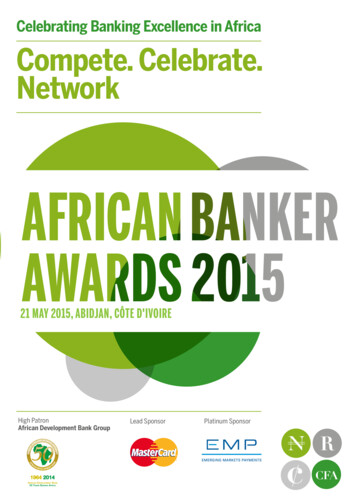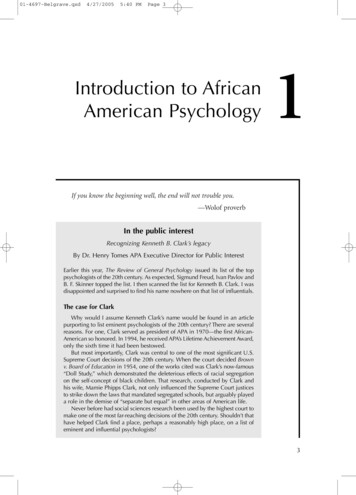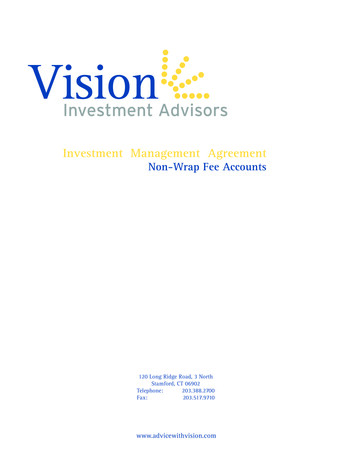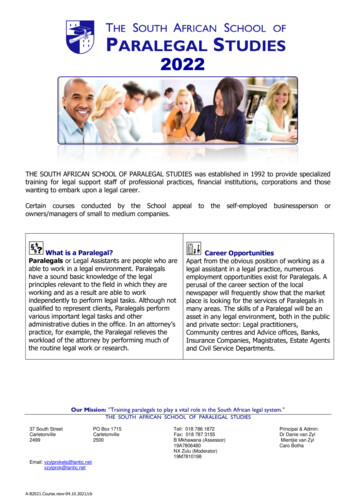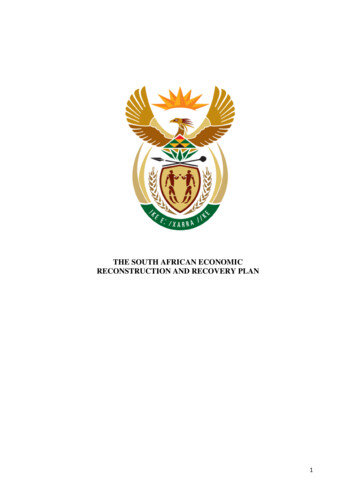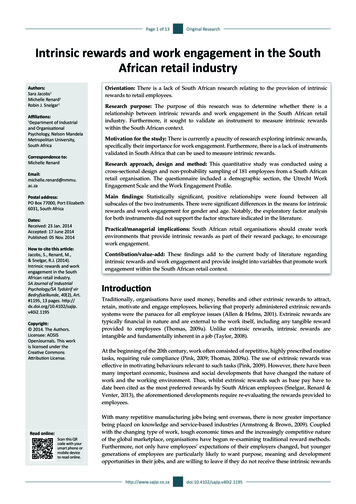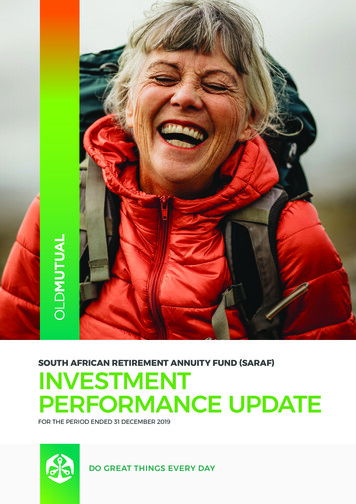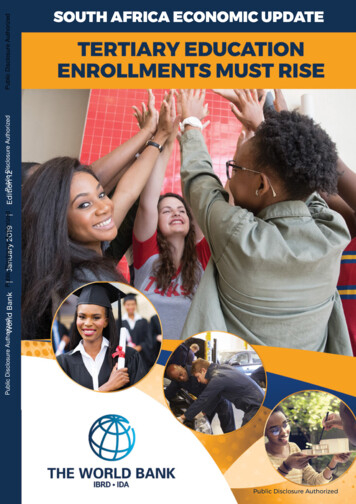
Transcription
South African investmentmanagement:Preparing for disruption
An examination of the global investment management industry“The key to effectiveinnovation is not only to tryinvent new products, butrather to couple this withan attempt to pre-empt thenext move of the market.”Author:Angela CostandiusNational Asset Management Key Account ManagerContributors:Anton van ZylAudit Manager: Financial ServicesGregory TomaselliInvestment Management Assurance ExpertThomas BurgersInvestment Management Assurance Expert03
ContentsThe Fintech Flurry04The consumer conundrum: Macro and micro08The Reign of Regulation10Conclusion111
An examination of the global investment management industryDeloitte annually shares an examinationof the global investment managementindustry with our clients1, giving them anin-depth view of the challenges andopportunities within the market whichassists with their vision of growth.In South Africa, investment managementhas evolved significantly over the past fiveyears, and in an environment where thereis increased emphasis on lower fees, costand the ever-changing investor needs, it isdifficult to find a competitive advantage andremain ahead of the pack. Yes, Investmentmanagement is a profitable and excitingbusiness, but there seems to be a blindspot for disruption as the core disruptorsgo against a set of entrenched principlesthat have characterised the industrythus far. Therefore, more than ever, it iscritical to evaluate the key disruptors inthe investment management market toeffectively formulate a plan for long-termgrowth.Cognisant of these key challenges, weisolated the following key disruptors in theSouth African market to three elements: The Fintech Flurry: The Fintech surge isreshaping the financial sector on a globalscale.2 New technologies have emerged,forcing a change in the current operatingmodels of investment managers. The Consumer Conundrum: Macroand Micro: The marketing approach ofinvestment management firms is evolvingto meet new demands as Generation X andthe Millennials enter the market – theseinvestors have little tolerance for traditionalcustomer engagement, are sceptic, techcentric and always connected. In additionto the micro-investor, to which targetgroups should investment managementfirms direct their efforts given currenteconomic turmoil? The Reign of Regulation: Due to the globalfinancial crisis, along with an impendingdowngrade, the regulators are increasinglyfocused on transparency, customer rightsand timely fund distribution.The key to effective innovation is not onlyto try invent new products, but rather tocouple this with an attempt to pre-empt thenext move of the market, the consumer orthe regulator. The question is then only howto do it successfully, while still remainingrisk-averse and ensuring that the assets ofclients are well-protected.In order to gear your business for the future,we will unpack these core principles byposing the questions you should considerwhen devising a strategy for the futureregarding your customers, your systems andthe regulation that looms.We hope that this report enables thisprocess in an insightful manner. Pleaseshare your feedback and questions with us.Roger VersterNational FSI LeaderDinesh MunuNational InvestmentManagement LeaderAngela CostandiusNational Asset ManagementKey Account Manager1. Deloitte: Investment Management Repositioned: Capitalising on the disruptive forces, 20162. Deloitte: How can Fintech facilitate fund distribution, 2016.2
An examination of the global investment management industry3
An examination of the global investment management industryThe Fintech FlurryWhen applying the technology boom to SouthAfrica, there have been great movements, but asany developing country, we are not on par with ourEuropean and American counterparts.Fintech is a portmanteau of financialtechnology that describes an emergingfinancial services sector. Since the endof the first decade of the 21st century,the term has expanded to include anytechnological innovation in the financialsector, including innovations in financialliteracy and education, retail banking,investment and even crypto-currencies likebitcoin 3.Consequently, therehas been exponentialinvestment into thisphenomenon, resultingin an explosion ofopportunities and threatsto the status quo ofinvestment management.When applying the technology boomto South Africa, there have been greatmovements, but as any developing country,we are not on par with our Europeanand American counterparts. The majorchallenge for South Africa is thereforewhether we have the right infrastructurewhen technology does eventually take over.At this stage, the three most prominentFintech disruptors out of a SouthAfrican perspective are crowd funding,the movement from active portfoliomanagement to passive digitalalgorithms and turning human “silos”of fund management (administration,custodianship, distribution) intotechnological solutions.Crowdfunding (Blockchain technology)Crowdfunding provides investors with adigital platform to pool their money andinvest in individual assets at extremelylow minimum investment amounts withvirtually no costs 4.Globally, crowdfunding has been makingsignificant waves, with BNP Paribas Groupand other similar companies leveragingBlockchain technology to enable privatecompanies to issue securities 5.YearFintech Investments in billion2014 12.042013 4.022012 2.742011 2.372010 1.82Source: Silicon Valley Bank Fintech Report 2015.The crowdfunding platforms usuallypass all the benefits and risks on to theinvestor and charge a small administrationfee on the asset value invested throughthe platform and have developedcomprehensive digital CRM solutions thatincorporate smart websites and mobileapps that allow the investor to view theirportfolio in real time anywhere and anytime.This significantly appeals to the risingyounger generation attracted to directreal time information on hand. Investableassets within current global crowdfundingplatforms include global properties ofall scales, equity in private businesses,start-ups and other assets that are hard toaccess for investors that are not ultra highnet worth individuals. Equity crowdfundinghas already been legalised and regulatedin the United States, China, Canada andEurope, which already offers businessesan easier and cheaper way to raise capitalthan listing on stock exchanges. It also offersindividuals alternative platforms to purchaseequity stakes in promising businesses.Direct property investments, which is notoffered by traditional asset management,is seen as one of the best investmentsby most individuals around the globe. Ascrowdfunding platforms currently offerthis type of investment at affordable pricepoints, it has a competitive advantageabove vanilla asset managers. In addition tothis, crowdfunding offers equity units intocommercial properties that are set up asa buy to let model, entitling the investorsto the income earned from rentals andany capital growth resulting from upwardproperty valuations.3. zz4BOMa0uxS4. Some platforms offer units in individual investments at a price point of 100 US dollars. There is a further drive to push this down to 1 US Dollar per unit, making it accessible to almost every individual around the globe.5. g/4
An examination of the global investment management industryWhere investors do not want the riskattached to equity, they also offerdebt units into properties, where theinvestor essentially purchases unitsinto bonds that are issued by propertydevelopers and consequently earnsinterest from the bonds. Examplesof the property crowdfunding modelinclude Fundrise and Wealth Migrate.They both employ large professionalteams that source and scrutiniseproperties with their investment gradecriteria, providing comprehensiverisk management and sourcing theproperty deals for the individualinvestors.Fundrise only operates in theUSA, whereas Wealth Migrate is aglobal company run from SouthAfrica. Wealth Migrate is currentlyworking with the FSB alongside theAfrican Crowdfunding association toimplement regulation for the new risingindustry in South Africa 6.alternative approach toinvesting and exposureto different assettypes at a lower costthan traditional assetmanagers.Some crowdfunding platforms havegone as far as to offer investorsthe chance to support or investin everything from legal battles totravelling around the world, with apotential return on investment. Itsappeal to individual investors tired oftraditional investment returns will onlygrow with global capital markets undercontinued pressure, which is perceivedto continue for the next three years.Should these regulations thereforebe promulgated, it would cause largedisruption to the industry.Crowdfunding is set tobe a large disruptor inthe investment industryas it has the potential totake market share fromtraditional investmentmanagers, by offering anCrowd funding investment platformsgenerated an estimated2.1 billionUSDollars ininvestment forstart-upsin 201575%-100% growthin U.S. equity crowdfunding volume of capitalraised in 2016 expected in the US GoldmanSachs went as far as to label crowdfunding as“potentially the most disruptive of all the newmodels of finance.”World Bank predicting thatcrowdfunding investments willbe a 96 billion a year marketin developing countries aloneby 2025.Source: crowdexpert.com6. eds-to-come-to-south-africa-says-scott-picken/5
An examination of the global investment management industryWhile there is a global movement toadopt Blockchain-operated investmentmanagement solutions, this is still notwidely adopted in South Africa. While theSouth African government does not viewBitcoin (which was the starting point ofBlockchain technology) as a legal form oftender 7, some developed countries, suchas the Isle of Man, is currently labelled asBitcoin Island 8, where bitcoin is used as acurrency for everyday transactions.The movement from active portfoliomanagement to digital algorithmsThe biggest change in modern financewas the introduction of the tracker fundin the 1970s. This probed a new school ofthought – where the digital processing ofmass amounts of data could potentiallyoutperform the active management offunds by human analysts. While activemanagement is long from dead, technologyhas however enabled the analysis ofmultiple companies in multiple jurisdictions– enabling the analyst to make moreinformed decisions than analysing eachcompany manually.Algorithms are not merely built on pasthistory and mathematical assumptions –many investment managers have combinedthese models with crowdsourcingdata. An example could potentially bean investment manager’s holdings ina medical aid company – medical aidsbecome more profitable as their membersare healthier, equating to fewer claims.Data collected from medical aid partnerssuch as gyms, supermarkets, healthpractitioner subscriptions and BMI recordscould be analysed to determine in-depthprobabilities of claim pay-outs, moreaccurate pricing models and possiblyfurther innovative industry relatedsolutions. The possibilities are endless.The volume of data worldwide wasestimated at 2.8 zettabytes in 2012 andexpected to grow to around 40 zettabytesby 2020. New intelligent technologies haveemerged to help process vast amountsof data (Big Data). With investmentmanagers now investing in building moreadvanced analytics and data managementcapabilities, the industry is going throughthe same transformation. 9Digital algorithms could potentiallyreplace analysts entirely – enabling assetmanagers to focus on building intelligentalgorithms instead of making difficultmicro-investment decisions, which is in linewith the global move toward technologicalreliance. Imagine the effect thereof – analgorithm so advanced it mimics thehuman brain characteristics closely, exceptit evolves every millisecond.In an industry where information ispower, it is not hard to see how firmsthat use these technologies may bethe long-term winners, nor is it difficultto imagine how such technology couldmaterially drive down the cost of activeasset management 10 with leaner and moreefficient operating models. In an economicclimate where the investor puts pressureon the investment manager relating tocosts – the combination of the human mindand technology could be a power tool increating a competitive advantage.7. A position paper on virtual currencies: South African Reserve Bank Position Paper number 02/20148. tcoin-island/9. Deloitte: How can Fintech facilitate fund distribution, 2016.10. Deloitte: Investment Management Repositioned: Capitalising on the disruptive forces, 20166The rise of the Robo:Currently there are minimal SouthAfrican digital back-office solutions,or digital custodians, the currentparticipators in the market areanticipating disruption. Smallerinvestment managers are cutting coststo remain competitive, and having adigital back office could potentiallyrealise that goal in totality.A major aspect of the South Africaninvestment management landscapecurrently in transition is the movementfrom a traditional human investmentadvisor to a robo-advisor. SouthAfrica’s first robo-advisor, Bizank,made large waves in the Investmentadvisory industry within its first week.SmartRand, InvestOnline, Beanstalk andSygnia RoboAdvisor followed shortly toparticipate in the hype.While investment managers aremoving towards an algorithm-basedinvestment decision-making process,there have been large local investmentsin providing clients with real-time CRMsolutions comprising automated advicetailored to the specific needs of theprospective investor.Historically, an investment advisorwould take 3-5% fees off the top of yourinvestment, and the options provided toinvestors would not necessarily consistof all the humanly available options.Robo-advisors, on the other hand, cancurrently be accessed as low as 20bpsand even free in some cases.They are currently new on the block,but should be seen as an opportunityfor your business to create a completelynew investment and digital experiencethat relates to the new-age investor.
An examination of the global investment management industrySo why does the robo-advisor offer a moreattractive option for investment than thetraditional salesperson? Digital advice is significantly cheaper andless likely subjective investment advice.As the FSB requires the companies thatoperate the robo-advisors to be licensed 11,it adds comfort around the algorithm andprocess for the investor. It provides a specifically tailoredinvestment solution that aligns to theneeds, goals and questions of thecustomer. A robo advisor, as it is based on analgorithm, provides real-time data basedon real-time results, paired with real-timeadvice– enabling the investor to makedecisions on real-time events. It alsoremoves the “human” judgement elementwhich may be prone to behaviouralbiases.Individuals on the edges of thewealth spectrumA local barrier to robo-advisors is the unfairspread of investor funds. On the one side,the majority of individuals in South Africalive in poverty, and even though they arethe individuals that should benefit themost from lower costs, they are limitedas they do not have access to as manycomputers, smartphones or as much dataas these are expensive. 12 This barrier ishowever becoming less of an issue assmartphones and data become cheaperand poor households adopting a priorityfor smartphones and internet connections.This increases opportunities for therobo-advisor industry to increase a newsegment of customers and assist the poormajority overcoming poverty using thistechnological revolution.On the other side, the high net-worthindividuals in South Africa, with themost investable funds, are familiar withthe screws and cogs of the investmentmanagement industry, and would notnecessarily engage with traditional financialadvisors.This gives rise to two situations in whichinnovation can play a great role – how caninvestment managers get the robo-advisorproduct to the masses, but also engage theindividual with the most investable assets,and convince them to rely on a computer?We do however predict that this is onlythe beginning of the robo-advisor and thatfund managers should react sooner ratherthan later as robo-advisors present thepotential for significant market disruption.The robo-advisor will most likely notreplace the human investment advisorentirely, but will provide a platform forindividuals on both sides of the SouthAfrican wealth spectrum an opportunity toengage with an advisor thus expanding thefinancial-advice market.Fintech is here to stay – many largeinvestment-management firms arededicating significant amounts of capital toinnovation on a technological front, whilesmall investment-management firms areusing technology to replace human capitalwhile still remaining competitive. Thesolution is to critically evaluate the effecttechnology could have on your businessover the short, medium and long termand plan a pro-active rather than reactiveapproach – as the reaction could possiblycome too late.Key Questions: How is crowdfunding going to affect the investment management industry? Are there aspects of the crowdfunding model that traditional investment managers could adapt and adopt? How are investment managers going to react to this new entrant and its disruptions? How can asset managers remain competitive? How can they lower fees and the minimum investment barriers? How can investment managers use information to make better decisions? How can investment managers have better data fluency? How can investment managers effectively harness Fintech to adapt to their changing customer base and needs? How can investment managers engage all investors in South Africa?11. rs-licensed/12. ing-levels-of-poverty-in-south-africa-revealed/7
An examination of the global investment management industryThe consumerconundrum: Macroand microMacroFollowing the economic crisis of 2008,the debt crisis of 2014, Nenegate andthe exceptionally turbulent ZAR/Anyother currency exchange rate, investableasset growth have most definitely beenturbulent and unpredictable over the pastfew years. Investment managers have todeal with an unpredictable economic andpolitical situation in South Africa, whichfollows none of the norms prescribed bytraditional economic principles.This brings forth a few keyquestions to address whendevising a plan for thefuture – which alternativejurisdictions offer solutionsshould the downgraderealise and where willfuture economic growthcome from?The short answer is that there are currentlyno straight-forward “safe havens” to putcapital to work. This being said, due tothe South African Rand being relativelycheap at the moment, it does make SouthAfrican investments look more attractivefor foreigners that believe in the returnto mean principle. However, for our localinvestors, due to interest rate hikes,inflation and adverse exchange rates, theaverage man on the street has very little tono disposable income to invest at this pointin time.South Africa is on negative watch by twoof the world’s largest rating agencies,Moody’s and S&P, therefore there is a riskof downgrade to junk status by the end of2016.Should the downgrade occur, it is expectedto be felt most by businesses from sixmonths to one year thereafter 13. Thiswould increase the likelihood of SouthAfrica following the same path that Russiaand Brazil did ever so recently. In boththese countries, US Dollar denominatedbond yields recovered after the initialshock, however they did not return tothe same levels prior to the downgrade.Investment managers should thus takeproactive steps to make their organisationsresilient by looking at possible hedgingtechniques and innovative solutions.The investment manager should thusdevelop a point of view in terms of wherethe world and consequently South Africa isheaded due to the global debt issue (shortand long-term) and how they can effectivelytrade to capitalise on downturns but alsocapture the subsequent upsides. Roboadvisors and algorithms can aid the process,but ultimately, following the economicand political developments are crucial topre-empt the availability and willingness ofsovereign creditors to pay their debt 14.Key Questions: What has my business done toready itself for the impendingdowngrade? Is there something else we cando? Something more? How can Investment managerseffectively pre-empt and preparethemselves for further economicand political instability? How can investment managersstructure products to organicallygrow business despite investorshaving marginally less disposableincome? Should local investmentmanagers opt to domicileadditional products in an offshorelocation in addition to their localoperations to maintain a flow ofmoney from foreign investorsshould local products becomesub-investment grade? Should the impending downgradeoccur, how can I reengineermy business to save costs?Automation, value-chainreengineering, or leveragingpartnerships?13. /rep id:413614. Deloitte: Investment Management Repositioned: Capitalising on the disruptive forces, 20168
An examination of the global investment management industryMicroIn order to efficiently and effectively sell aproduct, one needs to understand the marketand the customer. With a population ofapproximately 54 million people, close to 60%of whom are under the age of 35 15 , investmentmanagement companies cannot merely rely onthe retirement money of ageing individuals.The up and coming group of individuals arevastly different from the Baby Boomers –Generation X and Millennials, labelled as aquirky bunch of sceptical individuals, do notfollow the norms of old – and to prevent theseindividuals from becoming competitors ratherthan customers, it is imperative that their needsbe understood and business models realigned.Millennials are tech-centric,ever-connected and prefertechnological communicationrather than human interaction.Key Questions: How can investment managers own the customer experience in a world ofnew entrants? Will my business be relevant in 10 years’ time? How? Does my business understand, and is it geared to serve a youngerpopulation?Source: Deloitte: How can fintech facilitate fund distribution: 2016Lack of trust towards advisorBetter performance under self- managementPreference of managing own investmentsPoor/below expectation quality of adviceWrong investment optionsPerceived lack of competence of advisor0%They want to feel special and consequentlyrequire investment advice that is tailored tothem specifically, and they want to be in theposition to control the resulting investment.5%10%Mentalities of the Re-wiredInvestor15%20%25%30%Implications to IM firmsJust meTailor-MadeInvestment advice and products perceivedto be tailored to individuals on at a timeStay in controlMulti-channelAccess to multiple channels and severaladvisory models at the same timeThese investors are more sceptical of traditionaladvice than previous generations – they believein the wisdom of their peers and consequentlyprocure as much information from as manysources as possible before making a decision.This information could potentially includeexperts but in more situations include google,their friends or colleagues.Do it yourselfMultiple sources of adviceNot just from one advisor, but from otheradvisors, peers, experts and social mediaThey expect to access their investmentinformation at any time, at any place andthrough various channels – and this challengescurrent investment managers to invest in theironline client experience and service level.Sceptical of authorityAs a consequence, robo-advice is expectedto gain traction in the coming years, due tothe mind shift of the individuals entering themarket.Anywhere, anytimeDigital & PersonalWisdom of my tribeRisk defied as downsideNot a second Class InvestorRich digital front endExpectations formed interacting with nonFls; must be simple, intuitive, self-directedRisk Management as HedgingDownside protection and hedging morediversificationDemocratisation of InvestmentsAccess to same high yields assets &strategies once available only to wealthierinvestors15. en/Webber Wentzel Investing in South Africa complete.pdf9
An examination of the global investment management industryThe Reign of RegulationDue to the global financial crisis, and an impending downgrade, the regulators areincreasingly focused on transparency, investor rights and fund distribution. Since 2008there have been great changes in the regulatory landscape with increased focus oninvestment managers.Regulation shouldn’t be an act of justticking boxes – it should be an act ofregulating behaviour. That said, the moreeconomic or political issues arise in theworld, the more regulation follows withboxes to tick. The question is then, howinvestment managers can ensure that theirbusinesses are continuously compliant?The simple answer is to look around theworld – if the past repeats itself, pioneerregulation in Europe and the US will followsuit in South Africa. For example, Europehas regulations similar to POPI in play atthis point in time, where businesses arenot allowed to transact with Europeanbusinesses unless they comply with theseregulations – lessons can thus be learntfrom European companies regarding theimplementation of these regulations thatcould be used when POPI is promulgatedin South Africa. Another example wouldbe robo-advisors – the SEC has regulatedcertain algorithm elements of investmentmodels – at this stage, the only regulatoryrequirement of a robo-advisor in SouthAfrica is that the company that owns andoperates the robo-advisor should belicensed, but as (the inevitable) loopholesand crime perpetuates, additionalregulation will come into play.Due to the many financial crimes inSouth Africa 16, political and economicalinstability, there’s a lot of distrust inthe investment management market –investment managers therefore need tothink how they can use regulation to ratherincorporate an element of trust than viewit as a grudge purchase. That being said,distrust in the investment managementmarket is not unique to South Africa – thereis a sentiment shared among worldwideinvestors that investments “over promise,over charge and under-deliver” 17. Therefore,in addition to changing the minds ofsceptical investors, investment managersshould employ a prospective approachin terms of regulation – not a remediatingone. Looking at developed countries andthe movement in those markets creates agreat platform for proactive innovation inlocal markets.The solution is fairly simple in allcircumstances – having a system that isflexible, which can facilitate change – sucha system would give one investmentmanager competitive advantage overanother, merely because time is money.Take the introduction of FATCA as anexample – some investment managershad systems to facilitate the specificidentification of US investors right away,whereas other investment managershad to create completely new systemsand consequently carry hefty fines ontheir income statements. A future-proof,innovative system really can make allthat difference. In addition to this, proactively engaging with regulators throughco-operative feedback on regulationscould ensure that your business is on theforefront of new regulatory developments.European players have employed a Fintechsolution, called Regtech 18, a technologicalsolution for regulatory compliance.These products evaluate regulatorychanges across the world and providecompliance officers with a global and localview on compliance, aiding a prospectiveapproach to compliance and consequentlyincreasing investor trust.Regulation is not a disruptor that can betested or ignored – non-compliance cancause the destruction of a business, as theinvestment manager is responsible shouldone of the elements of an investmentproduct not function.Key areas that investment managersshould be looking at in terms of regulationsand compliance is fee arrangements,payment for distribution, trading, valuation,consumer protection and the selectionof third-party service providers 19. Thesetopics have been the major themes of theregulation of developed markets during thepast year.Therefore, this disruptor provides aunique opportunity for investmentmanagers to change a grudge purchaseinto a competitive advantage by merelylooking at the world and various marketdevelopments.Key Questions: How can investment managers“always” be compliant? What is the cost of complianceand how can investmentmanagers lower it over the longterm? How can investment managerslearn from others to pre-emptregulatory change? Is the system in my businessgeared for change?16. ollar-crime-a-threat-to-sa-businesses/19517. D818. Deloitte: How can Fintech facilitate fund distribution, 201619. Deloitte: Investment Management Repositioned: Capitalising on the disruptive forces, 201610
An examination of the global investment management industryConclusionThe three disruptors explored open up many questions and debates – who will be first?Who will fail? What is going to happen?It’s simple. For example, in a job interview, if you state the same skills as everyone beforeyou, you will most likely not get the job. What makes you different? Do you understand thepeople who are
1.Deloitte: Investment Management Repositioned: Capitalising on the disruptive forces, 2016 2.Deloitte: How can Fintech facilitate fund distribution, 2016. 2. An examination of te global investment management industry 3. An examination of te global investment management industry 4 When applying the technology boom to South Africa, there have been great movements, but as any developing country .


